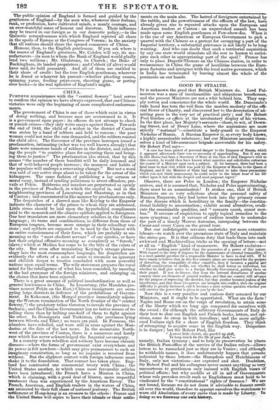CHINA.
FURTHER acquaintance with the "central flowery" land serves to confirm the opinion we have always expressed, that our Chinese victories were only the beginning of more complicated embarrass- ments.
The government of China is one of those which exist in virtue of doing nothing, and because men are accustomed to it. It is a government upon paper : its officers do not attempt to check or punish crimes—they only write essays against them. Towards the end of 1843, the child of a widow in the district of Canton was stolen by a band of robbers and held to ransom : the poor woman could not raise the sum demanded, and the robbers roasted the child alive. The Governor of the province hereupon issued a proclamation, intimating (what was too well known already) that there were numerous bands of robbers in the district, and exhort- ing the people "to contrive plans for capturing them and bring- ing them to justice." The proclamation also stated, that by this means "the number of these banditti will be daily lessened and that of well-behaved people increase ; the manners and habits of the populace will undergo a renovating change." But not a word was said of any active steps about to be taken for the arrest of the kidnappers. The same fashion of publishing a lay sermon or moral essay, instead of sending policemen to arrest offenders, pre- veils at Pekin. Robberies and murders are perpetrated as openly in the province of Pe-che-li, in which the capital is, and in the neighbouring provinces of Leaoutung and Shantung, as in that of Canton ; and encountered in like manner by proclamations only.
The despatches of a shrewd man like Keying to the Emperor indicate the character of the prince to whom they are addressed. Little stress should be laid upon the hyperbolical compliments paid to the monarch and the abusive epithets applied to foreigners. Our best translators are mere elementary scholars in the Chinese language ; its turns and combinations, so different from those of European tongues, become more strange in their schoolboy ver- sions • and epithets are supposed to be used by the Chinese with an entire consciousness of their force, which are probably as un- meaning as the "most obedient servant" of our epistles, or have lost their original offensive meaning as completely as " furosh," (slaved which at Medina has come to be the title of the rulers of the city. But even after translating Keying's strange phrase- ology into the most commonplace language, his despatches are evidently the efforts of a man of sense to reconcile an ignorant and childish despot to treaties concluded with more powerful nations upon equal terms. The wily statesman prepares the royal mind for the intelligence of what has been conceded, by sneermg at the bad grammar of the foreign ministers, and enlarging on the claims that.have been rejected. There is a great amount of political insubordination as well as general lawlessness in China. In Leaoutung, (the Mandshu pro- vince nearest Pekin on the East,) Chinese immigrants are occu- pying large districts in defiance of the prohibitions of Govern- ment. In Koko-nor, (the Mongol province immediately adjoin- ing the Western termination of the North frontier of the central flowery,") the predatory tribes threaten to invade the province of Sechuen ; and the Chinese Government has no better means of re, palling them than by bribing one-half of them to fight against the other. In Dsoongaria and Turkistan, (the provinces lying between Siberia and Tibet,) no taxes are paid. In Formosa the islanders have rebelled, and were still in arms against the Formosa,
at the date of the last news. In the mountains North- west of the province of Canton, there is a numerous and hardy race which has never acknowledged the Imperial sovereignty.
In a country where rebellion and robbery have become chronic diseases—where the forms of government exist everywhere and its power is felt nowhere—habit may give permanence to such an imaginary constitution, so long as no impulse is received from without. But the slightest contact with foreign influences must shake it to the foundation. That contact has taken place. Eng- land has contracted one commercial treaty with China the United States another, in which some more favourable articles have been introduced; the French have a Mission in China, which is claiming, with a _good deal of bluster, more respectful treatment than was experienced by the American Envoy. The French, American, and -English traders in the waters of China, are animated by their full share of national jealousy. The British
• settlement at Hong-kong- is an eyesore to the others : France and the United States will aspire to have their islands or their settle- ments on the main also. The hatred of foreigners entertained by the rabble, and the powerlessness of the officers of the law, have already given rise to repeated attacks upon the European and American traders at Canton : an unprovoked assault has been made upon some English gentlemen at Fow-chow-foo. When it is the cue of any American or European Government to pick a quarrel with the Chinese as a pretext for occupying a part of the Imperial territory, a substantial grievance is not likely to be long wanting. And who can doubt that such a territorial acquisition by any one state would stimulate all the rest to hasten to antici- pate each other in appropriating part of the spoil ? France has only to place Dupetat-Thouars on the Chinese station, in order to recommence in China the game of hostilities between the Euro- pean factories and intrigues with the local native governors, which m India has terminated by leaving almost the whole of the peninsula on our hands.


























 Previous page
Previous page